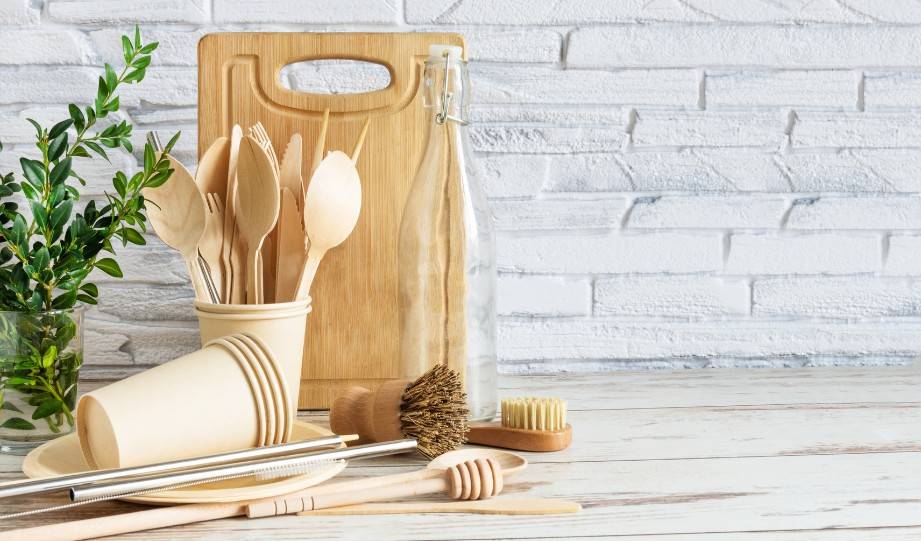Are you looking to make less of a negative impact on the environment? One of the most powerful ways to do this is by implementing some simple strategies in one of your house’s busiest rooms: the kitchen!
Here are 6 practical ways to make your kitchen more green.
6 Ways to Make Your Kitchen More Green
1. Where Possible, Reduce Packaging
The less packaging that you bring into your kitchen, the better for the environment. Here are several ways to reduce packaging:
Make Common Staple Foods Yourself
Foods like bread, crackers, cookies, and even tortillas are easy to make at home, provided you have some simple tools.
Get yourself a bread maker, or baking sheets, cookie cutters, even a tortilla press like this one: https://unocasa.com/products/tortilla-press
Tortilla presses are perhaps not the first appliance you will think of for your kitchen, but you can make not only tortillas, but sandwich wraps, dumpling skins, and empanadas (Spanish-style savory pastries) with it as well.
Once you start making homemade bread and wraps, you won’t go back.
Buy From Farmers’ Markets
Farmers’ markets are brilliant because they typically use minimal packaging compared to supermarkets. And the produce is usually better.
By bringing your bags and filling them with fruit and vegetables, you’re reducing plastic wrap and other items.
You can even keep and reuse egg cartons. Just buy eggs from the market or from local producers and fill your old egg cartons.
2. Prioritize Natural Materials
It’s becoming easier now to find eco-friendly kitchenware, such as bamboo utensils, wooden bowls, etc., so you should take advantage of that.
Here are other ways on how you can prioritize natural materials:
- Look for reusable kitchen cloths, which are more eco-friendly than paper towels.
- Swap paper napkins for cloth alternatives. They are washable, so they are more economical too.
- Wash and reuse glass jars. Glass jars are excellent for storing food because, unlike plastic, [1] glass doesn’t leak toxins into your food.
- Get yourself a reusable coffee filter rather than waste all that paper. You only need to buy it once. Then you can add your coffee grounds to your compost.
3. Save Energy Where You Can
Here are some easy-to-implement ways to save energy that you may not have thought of:
- Only run the dishwasher when it’s full.
- Upgrade older appliances for eco-friendly models that use less energy to run and have eco-savings settings.
- Only boil the kettle for what you are going to use right away.
- Unplug appliances until you need to use them. Many devices use energy just by being plugged in.
4. Filter Water
Switching to filtered water is a big one. If you’re someone who buys bottled water, think of all the bottles that you buy over a year. Even if you are buying glass bottles, that’s still a lot of energy to recycle them.
By using a water filter jug — or better yet, by installing a water filter under your sink — you will save money in the long run and contribute to fewer bottles in waste and recycling units.
5. Leave The Temperature Alone
Each time you peek inside your oven to see if your dish is done, you let heat escape. The oven, therefore, needs to expend more energy to recoup the loss. Instead, look through the oven door, or set a timer.
Also, decide what you want from the refrigerator before opening the door. Reflecting on the vagaries of life in front of an open refrigerator is another recipe for lost energy that’s unnecessary and wasteful. The same rule applies when you’re picking out products from a store freezer.
6. Invest In Reusable Food Wraps
There are many alternatives these days to plastic wrap, many of which are reusable. Once again, by using washable and reusable items, you’re saving money over time.
Some examples of reusable food wraps are beeswax wraps. You can also make your own out of cotton, beeswax, jojoba oil, or tree resin. This is a great project to involve the family.
If you don’t like food wraps, you can buy silicone food bags that are washable and reusable.
A Word On Composting And Recycling
Now I haven’t mentioned composting or recycling, because hopefully, you are doing those already.
Composting is one of the ultimate ways to keep your garden (or a neighbor’s garden) happy and productive. There are many solutions to compost containers that are easy to use, simple to clean, and won’t stink up your kitchen. One example is the Worm Factory 360 Black, a worm bin that you can easily use to compost in your apartment.
Also, if you aren’t recycling, now is the time to start.
If recycling isn’t available in your area, write to your local government because it should be.
References
- https://www.health.harvard.edu/staying-healthy/is-plastic-a-threat-to-your-health


